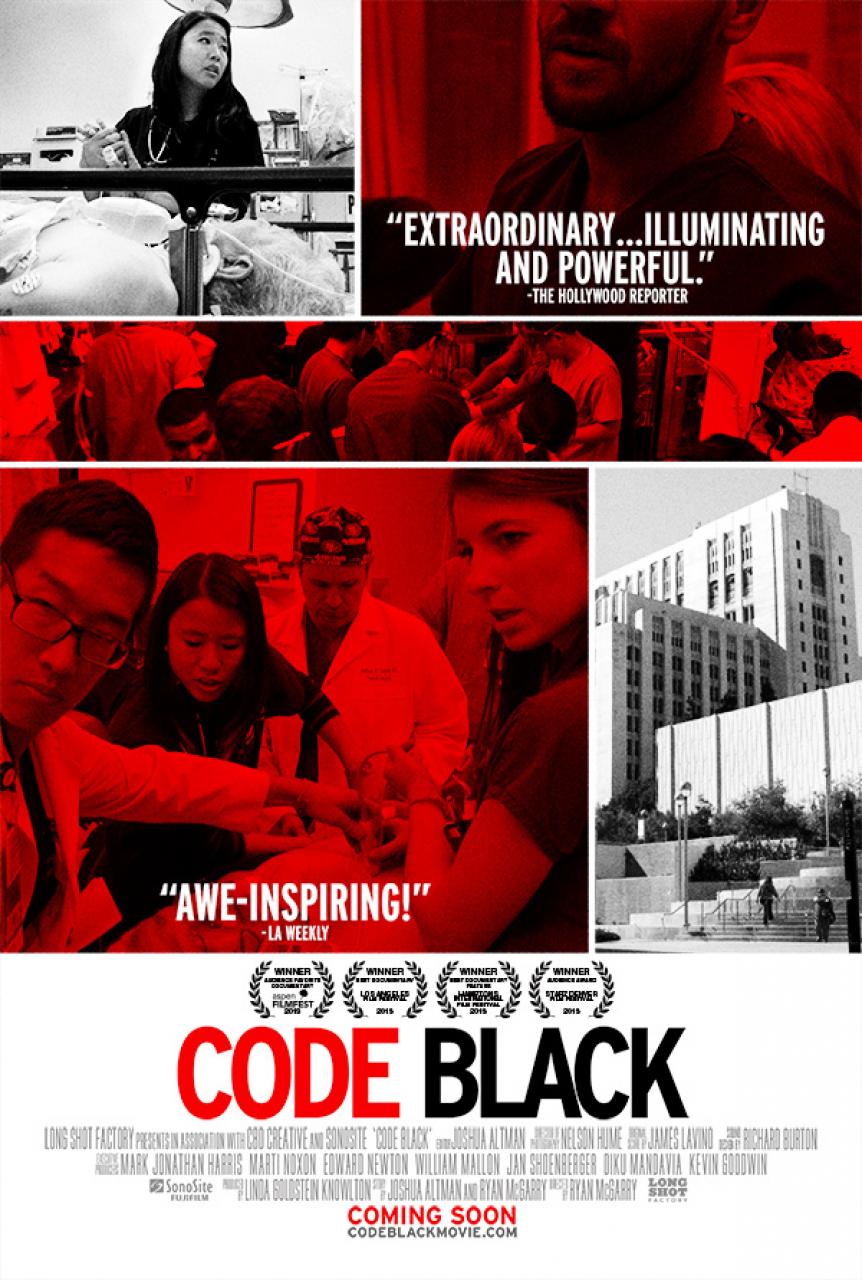 Code Black
Directed by: Ryan McGarry
Documentary
Running Time: 1 hr 20 mins
Rating: UR
Release Date: September 12, 2014 (Chicago)
Code Black
Directed by: Ryan McGarry
Documentary
Running Time: 1 hr 20 mins
Rating: UR
Release Date: September 12, 2014 (Chicago)
PLOT: A look into the lives of doctors-in-training working the emergency room at the new Los Angeles County Hospital, where their speedy work is impeded by recent regulations.
WHO'S IT FOR? Code Black is crucial viewing for anyone looking to take a stance on American health care.
OVERALL
The front lines of the American health care debate have finally spoken. This critical documentary comes from the perspective of the medical professionals who are trying to best do the jobs that relentlessly motivate them, who are now in danger of having their true purpose in the emergency room jeopardized. The vigorous Code Black is made by someone with first-hand experience, a former doctor-in-training at Los Angeles County Hospital, one of the very few places in this country that people can hope to receive uncompensated care. It is also Ryan McGarry’s first-directed film, as made within his own hours as a doctor-in-training at this very hospital.
This insane degree of passion, in which the adrenaline of the emergency room is channeled into the vigor of a filmmaker with something to say, defines this loving (and progressively frustrated) ode to the unsung work of doctors. With only the American health care debate mentioned in the beginning as something in the air, Code Black is extremely welcome as an issue-based documentary for the unique, necessary perspective it provides to the world of doctors. The film only becomes a definitively aggravating viewing experience to understand that this documentary had to even be made.
McGarry angles his editorial by showing filmgoers, who should probably skip the concessions this time, the visceral work hours of doctors in the emergency room. His camera is embedded in their continual yet selfless madness, while his editing spares little graphic detail as to the surgeries that put the duration of a patient’s life on a ticking clock. (In one of his most distinctly sobering choices as a doctor/filmmaker, he includes viewers into the morose moment of when the efforts to save a patient have been exhausted, and their time of passing is called out loud.)
Code Black utilizes an excellent narrative device with the changing of hospitals, as experienced by these doctors-in-training. With viewers taking even just hits of the superhuman adrenaline that motivates these doctors, who specifically want to be on the hectic front lines and working with these conditions of the human body that we would only have nightmares about, McGarry’s restlessness is conveyed when their environment suddenly changes. In this inspired story, the doctors are moved from an incredibly intimate emergency room called C-Booth to a new emergency area in a different hospital, which provides a revealing metaphor for the new obstacles that threaten their noble artistry: piles of paperwork, momentum-killing check-ins, and a waiting room time, for a county hospital especially, that easily averages a handful of hours. When the emergency room reaches code black, it is at its most helpless.
As a first-time filmmaker, McGarry is in narrative control of a fervor that has clearly motivated him to such an extraordinary end. He shoots what he knows, and he has the examples and the experiences, from himself and his former co-workers, to convey to audiences that which is often unseen but hooked into a narrative, and a cause, has superb clout. Their humbled, vibrant personalities are so palpable that his choice to stage them reenacting the outraged conversations they've already had is minimized in its sense of phoniness, as this type of passion can’t be changed; it definitely can’t be coached.
Without directly calling out to either side of the health care debate, Code Black posits that this political issue most of all concerns the relationships between doctors and patients. As well, the LA County Hospital, along with the other 2% of hospitals in this nation that provide such care, are the ones that can make the difference in the larger scheme of health care, especially if doctors are allowed to do their jobs without interference. McGarry honors this intimate association of patient and doctor with his fervid filmmaking, deriving from the same trust of someone who knows what can be done to fix issues in his field. It’s not immediately a matter of what is right or what can or can't be afforded, it’s about whatever is best to help.
FINAL SCORE: 8/10
